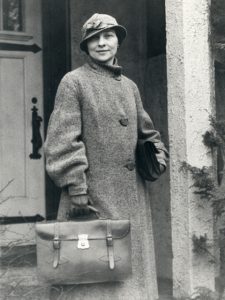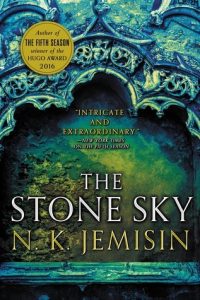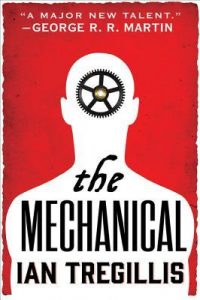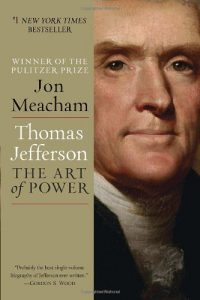My dad came to this country without a high school education, having stopped going to school when he was about 14. When he arrived, he didn’t know a word of English. He died having never become a citizen of the United States. He came with a drive for a better life, to improve his lot. He brought a tremendous work ethic that was second-to-none. He instilled this work ethic in his three boys, who all obtained college degrees and have had very successful careers in highly technical fields — engineering, environmental science, and physics. How is my dad not the type of immigrant we want in this country?
The Woman Who Smashed Codes by Jason Fagone
 The true makers of history are often hidden from us, either owners of softer voices or casualties of the rhetoric of louder glory-seekers. More often than not, those lost voices below to women and that is the case for Elizebeth Smith Friedman, one of the first people to develop a science for code-breaking and a key, if not the key, figure in the development of the US’s intelligence services. As the author of her story, The Woman Who Smashed Codes, Jason Fagone writes, “It’s not quite true that history is written by the winners. It’s written by the best publicists on the winning team.”
The true makers of history are often hidden from us, either owners of softer voices or casualties of the rhetoric of louder glory-seekers. More often than not, those lost voices below to women and that is the case for Elizebeth Smith Friedman, one of the first people to develop a science for code-breaking and a key, if not the key, figure in the development of the US’s intelligence services. As the author of her story, The Woman Who Smashed Codes, Jason Fagone writes, “It’s not quite true that history is written by the winners. It’s written by the best publicists on the winning team.”
The story of her and her husband, a leading code breaker in his own right, is fascinating, not only for the development of code-breaking as a science and their contributions to more than one war, but also because of the odd and eccentric characters that populate Elizebeth’s life. Her husband, William, was perpetually on the edge of a nervous breakdown, in part due to the extremely long hours both Friedmans put in service to the US government. Maybe most fascinating of all was Elizebeth’s first patron, George Fabyan, who created a compound outside of Chicago — the Riverbank Laboratories — which was a private laboratory researching a multitude of topics, some scientifically sound and others very much of the crack-pot variety. It was at Riverbank that Elizebeth first encounter cryptography and her future husband William. Riverbank was full of would-be scientists, studying a range of topics from hidden messages in Shakespeare’s plays to acoustics, for which it still exists. The compound raised all its own animals and grew much of its own crops for food.
During World War I, there was a dearth of people who understood encryption, much less could decipher the messages of the enemy. William and Elizebeth demonstrated their abilities and developed a true scientific approach to the problem. Both Friedmans had an uncanny knack of seeing patterns in data, at a time when computers weren’t available to help with the task. But, at the same time, one had to discern real patterns and not ones made up by their own brain. As Fagone writes, “Humans are so good at seeing patterns that we are often able to see patterns even when they aren’t really there” and “One way of thinking about science is that it’s a check against the natural human tendency to see patterns that might not be there.” Seeing and identifying real patterns was the first criterion for breaking a code.
 During the time the Friedmans were developing the science of cryptography and creating the profession of the cryptanalyst (“a person who analyzes and reads secret communications without the knowledge of the system used”), the world was changing at an incredible pace. Radio communications meant that agents could speak to each other across the globe, without the need to exchange paper. The atom bomb was being developed. Politics were changing too. J. Edgar Hoover was accumulating power in the FBI and was at odds with the military in the use of cryptography. What do you do when you break a code? As was highlighted in the movie The Imitation Game about the life of another famous cryptanalyst, Alan Turing, if you act on the intelligence from the broken code, you reveal the fact that the code is broken to the enemy, leading them to change the code and breaking that stream of intelligence. Her husband called this dilemma “cryptologic schizophrenia.” It is a no-win situation for the cryptanalyst, especially since human lives were often at stake. The FBI was chasing sensationalist news rather than maximizing the benefit to the nation of the broken codes.
During the time the Friedmans were developing the science of cryptography and creating the profession of the cryptanalyst (“a person who analyzes and reads secret communications without the knowledge of the system used”), the world was changing at an incredible pace. Radio communications meant that agents could speak to each other across the globe, without the need to exchange paper. The atom bomb was being developed. Politics were changing too. J. Edgar Hoover was accumulating power in the FBI and was at odds with the military in the use of cryptography. What do you do when you break a code? As was highlighted in the movie The Imitation Game about the life of another famous cryptanalyst, Alan Turing, if you act on the intelligence from the broken code, you reveal the fact that the code is broken to the enemy, leading them to change the code and breaking that stream of intelligence. Her husband called this dilemma “cryptologic schizophrenia.” It is a no-win situation for the cryptanalyst, especially since human lives were often at stake. The FBI was chasing sensationalist news rather than maximizing the benefit to the nation of the broken codes.
The story follows Elizebeth’s career from a scientist building the beginnings of a new scientific field to her work for the government, where she ultimately found a home with the US Navy, where she tracked Nazi spies in South America. She also worked for the US Treasury, intercepting the messages of crime lords working within the US. Throughout it all, Elizebeth simply did her work, serving her country, either not willing or even able to really tout her contributions and role in developing the field. In fact, after the death of her husband, she dedicated much of her life organizing his records and documents, his legacy, at the detriment of her own. However, her work, along with that of her husband, led directly to the spy agencies we have now, such as the CIA and NSA. What they created, however, ultimately led them to become uncomfortable, as the reach of agencies such as the NSA extended far into every aspect of our lives.
An interesting note that relates to our own times. In discussing the context of Germany in the lead-up to World War II, Fagone notes that “The international press covered him [Hitler] like a normal leader. Many Germans did not think he would really do the things he had said he would do.” Perhaps a caution for our own times.
Fagone weaves an excellent story, filling these larger-than-life characters with personality and telling an exciting story involving spies, drug dealers, and the future of Western Civilization. Learning about hidden heroes such as Elizebeth Smith Friedman is always a pleasure, even more so when the story is well executed.
The Stone Sky by N. K. Jemisin
The third and final installment in N. K. Jemisin’s The Broken Earth trilogy, The Stone Sky, continues to deliver. (The first two books are The Fifth Season and The Obelisk Gate.) It has everything anyone would want from a strong fantasy story — climactic battles, death-defying acts of bravery, and heart-tugging moments between characters. But, it is done in a way and in a world that is both unique and goes the extra step to pull you in, to make you care for these characters.
(The first two books are The Fifth Season and The Obelisk Gate.) It has everything anyone would want from a strong fantasy story — climactic battles, death-defying acts of bravery, and heart-tugging moments between characters. But, it is done in a way and in a world that is both unique and goes the extra step to pull you in, to make you care for these characters.
Jemisin’s world is so unique and so well developed, but even more importantly, her characters are deep. Characters that I hated in the first two books because they seemed so evil are given their own voice and own perspective. In the end, you realize that they aren’t evil but that their motivations are so against the protagonist that they seem evil. When they suffer, you feel for them.
And, this is probably the thing I’ve liked most about her books. Her worlds are grey. They are nuanced. There is no absolute evil, there is no absolute good. Good characters do bad things and bad characters do good things. Even the overarching conflict that drives the plot is about survival, of both sides. One side isn’t trying to conquer the world just because, but rather, both sides are fighting to exist, in some sense. It’s just that the fight ends up taking place on a planetary scale.
As in the previous two installments, Jemisin delves deep into issues that affect us in real life. There are questions about slavery, for example. In her world, there is a class of people that can control, to some degree, the tremors that wrack their world. These people — orogenes — have been subdued and controlled by regular people. They are treated as non-human. But, from the point of view of the regular people, this is almost essential. As one character states, “Orogenes are essential. And yet because you are essential, you cannot be permitted to have a choice in the matter. You must be tools — and tools cannot be people.”
The other big issue she tackles is the environment and people’s impact on it. It turns out that the horrible state that the current people find their world in is the direct consequence of a previous civilization’s attempt to extract energy from the planet. In some sense, the planet rebelled.
The broad theme of Jemisin’s book is subjugation and what happens when the subjugated, whether it be people or the planet, rebel. Whether it is an individual, a class of people, a whole civilization, or even an entire planet, at some point, things break, people can’t take any more, the environment shatters. What are the consequences when society or culture is built upon subjugation? “Some worlds are built on a fault line of pain, held up by nightmares. Don’t lament when those worlds fall.” There are lessons for all of us in The Broken Earth.
This is one of the best fantasy trilogies I have read, with characters that are meaningful, plots that engage, a story that is relevant, and a world that is nuanced and complex. I give it 5 stars.
An aside that I found interesting. Jemisin has a group of characters — called the stone eaters — that can communicate with each other through subtle tremors in the earth. They create microscopic earthquakes that they use to talk to one another. It is interesting how this is similar to the communications that the mechanical characters use in Ian Tregillis’ The Mechanical. The robotic characters there communicate via subtle changes in the motion of their gears and springs. In both worlds, these are the subjugated beings and they both find secret ways to communicate. An interesting coincidence.
The Mechanical by Ian Tregillis
 My grandpa only ever gave me one piece of advice (well, besides “keep your eyes on the damn road!”). He said, “They can take your land, they can take your property, they can even take your family, but,” pointing to his head, “they can’t take what is in here. They can’t take what you know. So, learn as much as you can.”
My grandpa only ever gave me one piece of advice (well, besides “keep your eyes on the damn road!”). He said, “They can take your land, they can take your property, they can even take your family, but,” pointing to his head, “they can’t take what is in here. They can’t take what you know. So, learn as much as you can.”
Well, what if they sort of could? Or at least, take away your ability to think for yourself?
That is sort of the premise of Ian Tregillis’ The Mechanical. The Mechanical is set in a world where, sometime after Europeans stumbled across the Americas, the Dutch find a way to make sentient machines, through some alchemical process discovered by famous Dutch scientist Christiaan Huygens (what?!? You’ve never heard of him? He discovered a moon of Saturn, invented the pendulum clock, and was a major authority on optics). This gives the Dutch a leg up in the world, and allows them to conquer pretty much all of Europe. Seemingly only the French remain to resist, and they must do this from a small enclave in exile on the North American continent. This is the backdrop for an amazing story of court intrigue, international politics, and a different approach to the discussion of slavery.
This is, because, we quickly come to learn that the machines the Dutch build their empire on not only think, but have some sort of free will, a free will that is subdued by whatever process creates them. Whenever they try to do anything that is not in direct fulfillment of their masters’ wishes, they experience extreme pain, a pain that grows until it is completely intolerable and the machine is forced to act to subdue the pain. “The head faded as he [one of the machines] abandoned his own wishes in favor of his masters’ whims.” Thus, the machines are slaves, forced to subvert their own will to that of their human masters’. Tregillis does a great job of describing the torment the machines feel whenever they try to do something on their own.
With this backdrop, Tregillis discusses free will, slavery, and equality, in a way that advances the plot of his story. One of the main characters, Jax, is one of these machines. But, there are several human characters that represent various views of the treatment of these machines. Not all humans are blind to the suffering of these machines, but even some that are against the Dutch would rather use the machines for their own purposes. “The prosperity achieved through slavery had a way of blinding men’s hearts to the evil of their own hands.”
Thus, along the way, Tregillis, while telling an immensely satisfying story, does get into some pretty deep thoughts about the nature of free will itself. Do the machines have free will? Maybe they don’t, by some definition, but then, maybe humans don’t either. For the machines, “Free Will was a vacuum, a negative space. It was the absence of coercion, the absence of compulsion, the absence of agony.” But, what does that mean for humans? “How did they order their daily existence without somebody to tell them what to do? Or was that the purpose of God?” Or are humans “Some squishy biological machine whose structure imbues it with a complex functioning and a delusional belief in its capability to determine its own course, but which all along follows a path predetermined by its own nature or maker?”
It is always nice to find a book that both provides a very interesting plot as well as thought-provoking material. The discussions about free will flow naturally through the course of the book, they are not force fed or heavy handed. Rather, they are integral to the relationship between the machines and the humans. They drive the plot forward. Tregillis does a great job of pulling these themes forward but in service of his story. I think my ony quibble is that, at the end of the story, some of the actions of some of the characters seem less than reasonable. One can chalk this up to the trauma some of them have endured up to that point, but it still seemed a little forced, like Tregillis needed a way to get to a certain point in the plot and this was the best he could come up with.
However, in spite of this, I am greatly looking forward to reading the next books in the series.
Thomas Jefferson: The Art of Power by Jon Meacham
 Growing up, my hero was Thomas Jefferson. Here was a man who seemingly did it all: he was of course a leading figure in the founding of our nation, but he was also a gifted writer and a deep thinker, embracing a scientific view of the world. He founded the University of Virginia and, as president, drastically expanded the lands that would eventually become part of the United States. He seemed the epitome of a so-called Renaissance man.
Growing up, my hero was Thomas Jefferson. Here was a man who seemingly did it all: he was of course a leading figure in the founding of our nation, but he was also a gifted writer and a deep thinker, embracing a scientific view of the world. He founded the University of Virginia and, as president, drastically expanded the lands that would eventually become part of the United States. He seemed the epitome of a so-called Renaissance man.
However, as with most things, as I got older, I learned that Jefferson was a much more complex figure, full of contradictions. In the Declaration of Independence, he penned “We hold these truths to be self-evident, that all men are created equal,” yet, he owned slaves. In fact, he had an ongoing relationship with one of his slaves, Sally Hemings, with whom he fathered several children. He presented a face of aloofness to politics, seemingly above the pettiness of parties, but, behind the scenes, he was actively engaged in attacking rivals and disparaging other ideas. He was against centralized Federal power until he held it and solidified it significantly. He was terribly afraid of what others thought about him but he continued to search out the central position of national affairs.
The point of Jon Meacham’s The Art of Power is to delve into the mind of Jefferson, to explore the seeming contradictions, to understand the full person. Meacham’s goal isn’t to describe in detail all of Jefferson’s accomplishments. In fact, major events such as the revolution, Jefferson’s time in France, even his presidency are, effectively, only briefly described. Rather, it is Jefferson’s innermost thoughts that Meacham tries to probe, mostly through Jefferson’s copious correspondence and the thoughts of his contemporaries. A complex picture arises of a man who, at his core, has two primary drives: he wants to be a great man and he wants the American experiment to succeed. He needed power and control. He needed to shape his life and society to his vision of them.
It is perhaps this that best explains Jefferson’s political life. He was so afraid that Americans, particularly the Federalists such as Adams, would revert to a monarchy of some form — worse, rejoin Britain — that he made it a key mission in his life to subvert such efforts. He felt that an educated people would make the right decision, that education begat reason and that, in turn, would lead to a good government. He expounded “the freedom to use reason publicly in all matters” and that “reason, not revelation or unquestioned tradition or superstition, deserved pride of place in human affairs.” However, he knew that an uneducated public was a danger: “if the members are to know nothing but what is important enough to be put into a public message… it becomes a government of chance and not design.” To make informed decisions, people must be informed. “In a republican nation whose citizens are to be led by reason and persuasion and not by force, the art of reasoning becomes of first importance.”
The contradictions in Jefferson’s life are best embodied in his views on slavery. It seems that he did make some admittedly small efforts to end slavery, or at least mitigate it, but, after a few defeats, he gave up. He didn’t advocate for outright freedom, but emancipation and deportation. He didn’t believe that the two races could live side by side. He realized that the institution of slavery would lead to a crisis, but he, along with many of his contemporaries, decided to punt on the issue of slavery in favor of establishing an imperfect United States. The country would later suffer greatly for this, but, in his mind, there would have been no country if they hadn’t gone this route. Perhaps Jefferson’s biggest failing is that, while he tried so hard to exert his views and meld society to his vision in other aspects, he simply “chose to consider himself powerless” over the issue of slavery. Even in his personal life, he didn’t act on his principles, only freeing those slaves which were his own children (by an arrangement with Sally when she lived with him in France to guarantee her return with him). This is where Jefferson, as a hero, comes crashing down the hardest. This isn’t simply a case where Jefferson was no less enlightened than his peers. There were many who advocated for the end of slavery. Some of his fellow Virginians freed their slaves. Emancipation was not a foreign concept, something that hadn’t even crossed their minds. As Meacham says “Jefferson was wrong about slavery,” even from a contemporary perspective.
His personal life was often filled with days of scientific inquiry. He had an enlightened view on experimentation, stating that “I have always thought that if in the experiments to introduce… new plants, one species in a hundred is found useful and succeeds, the ninety-nine found otherwise are more than paid for.” Further, he knew that not all discoveries immediately led to an amazing new application. He advocated for science for its own sake: “The fact is that one new idea leads to another, that to a third and so on through a course of time, until someone, with whom no one of these ideas was original, combines all together, and produces what is justly called a new invention.” This is a view that science requires sustained effort and encounters much failure for every success, a view that we would do well to continue to adopt in our own times.
Jefferson spoke a strong game when in the political opposition, arguing against any centralization of power and against a strong centralized government. He was a pure democrat. But, upon gaining power, he didn’t hesitate to use it. As Meacham says “It was easy to speak theoretically and idealistically about politics when one is seeking power. The demands of exercising it once it is won, however, are so complex and fluid that ideological certitude is often among the first casualties of actual governing.” This seems to be an insight we could take to heart today. We are often swayed by idealistic arguments about how the government should work, about how society should work, but we neglect the actual difficulties of governing. We are given platitudes about how things will change, but then are frustrated when they don’t change enough. This is how it has been since the founding of the country and is not likely to change any time soon.
Most intriguingly, Jefferson seemed to have a good perspective on his place in history. He was certainly very proud of his achievements, but he also knew that history would inflate them, would place the achievements of his generation on a pedestal to be almost worshipped. “They ascribe to the men of the preceding age a wisdom more than human, and supposed what they did to be beyond amendment… I am certainly not an advocate for frequent and untried changes in laws and constitutions… but I know also that laws and institutions must go hand in hand with the progress of the human mind… We might as well require a man to wear still the coat which fitted him when a boy, as civilized society to remain ever under the regimen of their barbarous ancestors.” Jefferson knew that people and societies change and that their laws must change with them.
This book isn’t exactly an overview of Jefferson’s life. Rather, it tries to delve into his motivations, his thoughts, using his own words. It tries to understand what drives him. At times, it is a little frustrating in that the context isn’t fully fleshed out — the historical backdrop isn’t always clearly presented, but rather assumed — though to fully paint the picture would have led to an enormous volume. Further, there is no deeper analysis of what Jefferson was thinking. In some sense, he is simply presented, with all of his contradictions. That we can’t delve deeper is frustrating, but the simple fact of the matter is that this is the best we can do. We don’t have him here to talk to, so we can only analyze what he wrote and what others wrote about him. Thus, we are left with an imperfect portrait of an imperfect man, one who stood above others in many ways, but who certainly had his own failings. As Meacham says, “He was not all he could be. But no politician — no human being — ever is.”
I certainly gained a new appreciation for Jefferson, both his accomplishments and the motivations behind them. As an adult, I know no human is perfect and no one can be held up on an unquestioned pedestal. Jefferson, as part of the generation that led to the American experiment, is a great man, a man that is inspiring both for the depth of his thoughts and the breadth of his activities. He is also a small man, for his failures. He is a real human who made enormous sacrifices in some domains of his life but was unable to make others that were equally important. Is he my hero? No. But he is still a man I can admire, understanding that he was, as we all are, a flawed human being.
A few other Jeffersonian snippets I thought worth sharing:
- We have no rose without its thorn; no pleasure without alloy. It is the law of our existence; and we must acquiesce.
- Question with boldness even the existence of a God; because, if there be one, he must more approve the homage of reason, than that of blindfolded fear.
- Experience declares that man is the only animal which devours his own kind.
- [Good humor] is the practice of sacrificing to those whom we meet in society all the little conveniences and preferences which will gratify them, and deprive us of nothing worth a moment’s consideration; it is the giving a pleasing and flattering turn to our expressions which will conciliate others and make them pleased with us as well as themselves. How cheap a price for the good will of another!